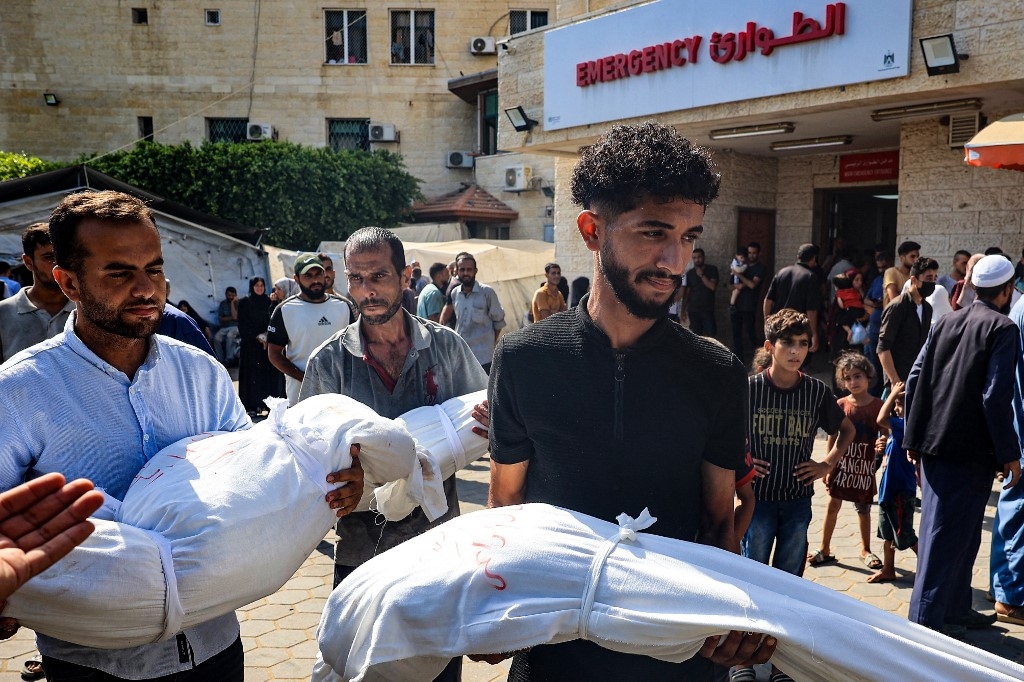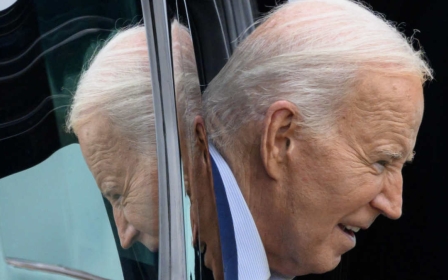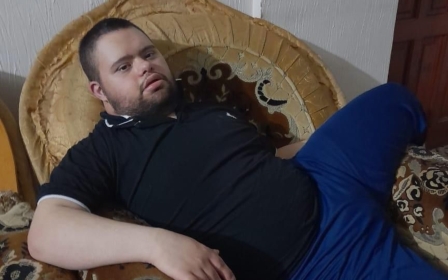Dozens killed and wounded in Israeli 'massacre' at displaced people camp in Khan Younis

Dozens of Palestinians have been killed and wounded in Israeli strikes on a displaced people's camp in Gaza's Khan Younis, according to the government media office.
Gaza's health ministry said at least 88 Palestinians were killed in Saturday's attack, adding that 289 others were injured.
Hamas said the bombardment caused a "massacre" in tents housing displaced people in the Mawasi district of Khan Younis, an area that Israel had reportedly designated a safe zone.
Nabil Walid, based in Khan Younis, told Middle East Eye that a missile hit the Ajrar gas complex, which led to an explosion, while another struck a water desalination plant.
"Horrors. About six f-16 planes dropped bombs down on us in Nasser road, around the area of the Sultan water station," he said, saying people were thrown all over the ground.
New MEE newsletter: Jerusalem Dispatch
Sign up to get the latest insights and analysis on Israel-Palestine, alongside Turkey Unpacked and other MEE newsletters
"First the strikes [hit] the ground, and then on a residential building, and then after all this, the planes didn't leave the area."
"From 11am till now, the quadcopters are surrounding the area."
Aida Abed Mahmoud Hamdi told MEE she was baking when the first strike hit.
"I grabbed my daughter and we started running outside. I threw the dough and it was covered with sand, the kids came around me, hungry wanting to eat," she said.
"The strikes came one after the other. Even those around me, some of them died - men, women and young people."
She said that she saw the bodies of children among the civilians killed in the strike.
Israeli army radio cited defence sources as saying the target of the strikes was Mohammed Deif, head of Hamas's military wing, which the Israeli army later confirmed.
However, a Hamas official told Reuters this was "nonsense".
"All the martyrs are civilians, and what happened was a grave escalation of the war of genocide, backed by the American support and world silence," Abu Zuhri said, adding that the attack proved Israel was not interested in a ceasefire.
Meanwhile, Ameer Makhoul, a Palestinian activist and writer who lives in Israel, told MEE that it is clear that Israeli Prime Minister Benjamin Netanyahu is "losing control over the management of the situation" regarding any ceasefire deal.
"Netanyahu is faced with the choice of either a rolling out a regional explosion or resorting to some kind of deal," Makhoul said.
"This terrible massacre, however, reveals the falsity of the US-Israeli dispute over American ammunition and its use against Palestinian civilians in so-called 'safe areas'," he continued.
Hamas later issued a statement on Telegram calling on Palestinians in the West Bank and occupied East Jerusalem to hold "massive demonstrations" in response to the Israeli attack on Mawasi.
Journalist Firas Abu Sharkh, who was reporting from the scene, said Israeli forces "directly targeted" civil defence and Ministry of Health teams working to recover the dead and wounded in Mawasi.
This was also reported by the military correspondent from Israel's Yediot Ahronot, who said on X (formerly Twitter) that the army had "continued to attack the compound where Deif was staying even after the initial attack to make sure that the rescue forces did not arrive to rescue the terrorists".
Overwhelmed with bodies
An official at Nasser Hospital in Khan Younis has said that they were overwhelmed with bodies and injured people following the attack on Mawasi, Al Jazeera reported, adding that the medical teams did not have the capacity to treat any more.
"At this moment, there is no final tally of the number of dead and wounded, and the numbers are constantly increasing," said Walid.
Mohammed Al Khatib, a worker for Medical Aid for Palestinians based in Khan Younis, said his organisation had been forced to temporarily evacuate one of their medical points, intended to provide primary health care services, due to the "insecurity".
"Al-Mawasi is heavily crowded and has a big market where people move around to try and secure their basic needs," he said in a statement.
More than 38,000 Palestinians have been killed in Gaza since 7 October, medical authorities in Gaza say.
Israel's assault on Gaza came in the wake of a Hamas attack on southern Israel that saw 1,171 people killed and hundreds taken captive. Israel has pointed to Deif as one of the masterminds behind the operation.
Prime Minister Benjamin Netanyahu's office said in a statement on Saturday that he gave a "permanent directive to eliminate senior Hamas officials" at the beginning of the war, adding he would hold security talks throughout the day to discuss further developments.
Abed Abu Taha, another witness to Saturday's attack, asked why the world was not intervening in Gaza.
"No one can imagine this - you're eating and next thing you're martyred. This is wrong. Why dont the Arab nations stand with us?" he told MEE.
"It was like the day of judgement, everyone is running away. A person runs away from their child, from their wife, from even themselves."
Middle East Eye delivers independent and unrivalled coverage and analysis of the Middle East, North Africa and beyond. To learn more about republishing this content and the associated fees, please fill out this form. More about MEE can be found here.




